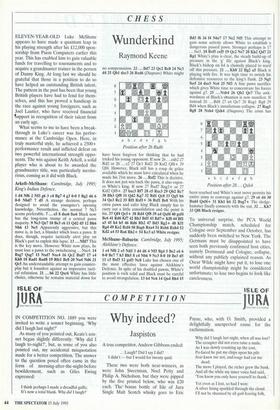CHESS
Wunderkind
Raymond Keene
ELEVEN-YEAR-OLD Luke McShane appears to have made a quantum leap in his playing strength after his £12,000 spon- sorship from Psion Computers earlier this year. This has enabled him to gain valuable funds for travelling to tournaments and to acquire a grandmaster trainer in the person of Danny King. At long last we should be grateful that those in a position to do so have helped an outstanding British talent. The pattern in the past has been that young British players have had to fend for them- selves, and this has proved a handicap in the race against young foreigners, such as Joel Lautier, who have received financial upport in recognition of their talent from an early age.
What seems to me to have been a break- through in Luke's career was his perfor- mance at the Cambridge Open. Here, in truly masterful style, he achieved a 2500+ performance result and inflicted defeat on two powerful international strength oppo- nents. The win against Keith Arkell, a solid player who is about to be awarded the grandmaster title, was particularly merito- rious, coming as it did with Black.
Arkell—McShane: Cambridge, July 1995; King's Indian Defence.
1 d4 Nf6 2 g6 3 c4 Bg7 4 g3 0-0 5 Bg2 d6 6
0-0 Nbd7 7 d5 A strange decision, perhaps designed to avoid the youngster's opening knowledge. Nevertheless, the normal 7 Nc3 seems preferable. 7 ...e5 8 dite6 fxe6 Black now has the long-term trump of a central pawn majority. 9 Nc3 Qe7 10 Be3 c6 11 Qd2 d5 12 Bh6 Nb6 13 Ne5 Apparently aggressive, but this move is, in fact, a blunder which loses a pawn. It does, though, require tactically alert play on Black's part to exploit this lapse. 13 ... Nfd7 This is the key move. However White now plays, he must lose a pawn to the zwischenzug ...Nxc4. 14 Bxe Qxg7 15 Nxd7 Nxc4 16 Qc2 Bxd7 17 e4 Kh8 18 Radl Rad8 19 Rfel Bc8 20 Na4 Nd6 21 QcS An understandable attempt to gain counter- play but it founders against an impressive tacti- cal refutation. 21 ...b6 22 Qxc6 White has little choice, otherwise he remains material down for no compensation. 22 ... Bd7 23 Qc2 Rc8 24 Nc3 d4 25 Qbl dxc3 26 Rxd6 (Diagram) White might have been forgiven for thinking that he had tricked his young opponent. If now 26 ...ab2 27 Rd2 or 26 ... c2 27 Qcl Rxf2 28 Kicf2 Qf8+ 29 Qf4. However, Black still has a coup de grace available which he must have calculated when he made his 21st move. 26 ...Rxf2 This is decisive. It does not just win back the pawn, it also expos- es White's king. If now 27 Ftxd7 Rxg2+ or 27 Kxf2 Qf8+. 27 bxc3 Rf7 28 e5 Rxc3 29 Qb2 Rc7 30 Bh3 Qf8 31 Qd2 Kg7 32 Ed! Qc8 33 Qg5 h6 34 Qe3 Rc2 35 Rfl Rxfl+ 36 &di Be8 With his extra pawn and safer king Black simply has to carry out a little consolidation and the point is his. 37 Q14 Qc5+ 38 Rd4 Q18 39 a4 Qxf4 40 gxf4 Bc6 41 Rd6 Kf7 42 Bh3 Bd5 43 Rd7+ KM 44 Bfl a5 45 h4 h5 46 Rd6 Rb2 47 Bd3 Rg2+ 48 Kfl Rg4 49 Ke2 Rxf4 50 Bxg6 Rxa4 51 Ritb6 Rith4 52 Kd2 a4 53 Ra6 Rh2+ 54 Kc3 a3 White resigns.
McShane—Baburin: Cambridge, July 1995; Alekhine's Defence.
1 e4 Nf6 2 e5 Nd5 3 d4 d6 4 Nf3 Bg4 5 Be2 e6 6 0-0 Be7 7 h3 Bh5 8 c4 Nb6 9 Nc3 0-0 10 Be3 d5 11 c5 Bxf3 12 gicf3 Nc8 Luke has chosen one of the most effective lines against Alekhine's Defence. In spite of his doubled pawns, White's position is rock solid and Black must be careful to avoid strangulation. 13 b4 Nc6 14 Qa4 Bh4 15 Bd3 f6 16 14 N6e7 17 Ne2 Nf5 This attempt to gain some activity allows White to establish a dangerous passed pawn. Stronger perhaps is 17 ...bce5. 18 Bxf5 exf5 19 Qc2 Ne7 20 ICh2 Qd7 21 Rgl White's plan is clear, the steady build-up of pressure in the `g' file against Black's king. Black's bishop on h4 is clumsily placed to ward off this pressure. 21 ...Kh8 22 Rg2 a5 Black is playing with fire. It was high time to switch his defensive resources to the king's flank. 23 Ngl fice5 24 dxe5 Nc6 25 NB A fine pawn sacrifice which gives White time to concentrate his forces against g7. 25 ... Nxb4 26 Qb2 Qe7 The awk- wardness of Black's situation is now manifest. If instead 26 ... Bd8 27 e6 0e7 28 Rag1 Rg8 29 Bd4 when Black's installations collapse. 27 Rag! Rg8 28 Nxh4 Qxh4 (Diagram) The crisis has been reached and White's next move permits his entire army to converge against g7. 29 e6 d4 30 Bxd4 Qxf4+ 31 Kb! h6 32 Bxg7+ The sledge- hammer finally connects with the nut. 32 ...Kh7 33 Q16 Black resigns.
To universal surprise, the PCA World Championship match, scheduled for Cologne over September and October, has• suddenly been switched to New York. The Germans must be disappointed to have seen both previously confirmed host cities, namely Dortmund and Cologne, collapse, without any publicly explained reason. As Oscar Wilde might have put it, to lose one world championship might be considered unfortunate; to lose two begins to look like carelessness.


















































 Previous page
Previous page